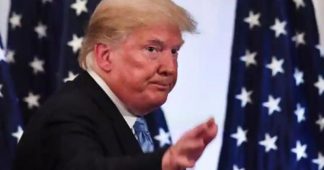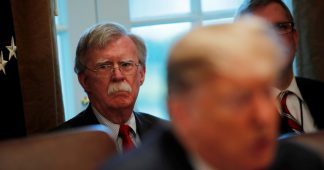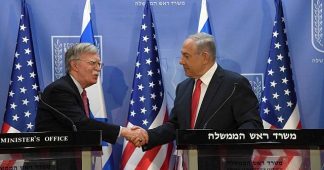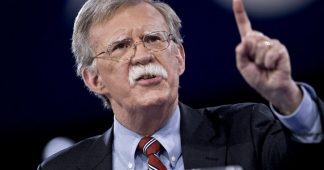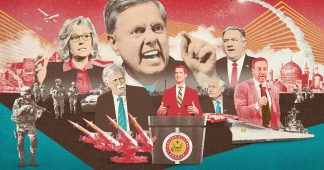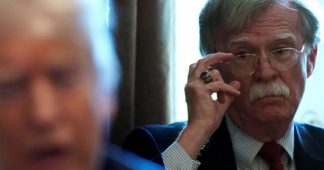How a discredited foreign policy ideology continues to wreak havoc in Washington and around the world
By Illustration by Ryan Olbrysh
There was a time not so long ago, before President Donald Trump’s surprise decision early this year to liquidate the Iranian commander Qassem Soleimani, when it appeared that America’s neoconservatives were floundering. The president was itching to withdraw U.S. forces from Afghanistan. He was staging exuberant photo-ops with a beaming Kim Jong Un. He was reportedly willing to hold talks with the president of Iran, while clearly preferring trade wars to hot ones.
Indeed, this past summer, Trump’s anti-interventionist supporters in the conservative media were riding high. When he refrained from attacking Iran in June after it shot down an American drone, Fox News host Tucker Carlson declared, “Donald Trump was elected president precisely to keep us out of disaster like war with Iran.” Carlson went on to condemn the hawks in Trump’s Cabinet and their allies, who he claimed were egging the president on—familiar names to anyone who has followed the decades-long neoconservative project of aggressively using military force to topple unfriendly regimes and project American power over the globe. “So how did we get so close to starting [a war]?” he asked. “One of [the hawks’] key allies is the national security adviser of the United States. John Bolton is an old friend of Bill Kristol’s. Together they helped plan the Iraq War.”
By the time Trump met with Kim in late June, becoming the first sitting president to set foot on North Korean soil, Bolton was on the outs. Carlson was on the president’s North Korean junket, while Trump’s national security adviser was in Mongolia. “John Bolton is absolutely a hawk,” Trump told NBC in June. “If it was up to him, he’d take on the whole world at one time, OK?” In September, Bolton was fired.
The standard-bearer of the Republican Party had made clear his distaste for the neocons’ belligerent approach to global affairs, much to the neocons’ own entitled chagrin. As recently as December, Bolton, now outside the tent pissing in, was hammering Trump for “bluffing” through an announcement that the administration wanted North Korea to dismantle its nuclear weapons program. “The idea that we are somehow exerting maximum pressure on North Korea is just unfortunately not true,” Bolton told Axios.
Then Trump ordered the drone strike on Soleimani, drastically escalating a simmering conflict between Iran and the United States. All of a sudden the roles were reversed, with Bolton praising the president and asserting that Soleimani’s death was “the first step to regime change in Tehran.” A chorus of neocons rushed to second his praise: Reuel Marc Gerecht, a former CIA officer and prominent Never Trumper, lauded Trump’s intestinal fortitude, while Representative Liz Cheney hailed Trump’s “decisive action.” It was Carlson who was left sputtering about the forever wars. “Washington has wanted war with Iran for decades,” Carlson said. “They still want it now. Let’s hope they haven’t finally gotten it.”
Neoconservatism as a foreign policy ideology has been badly discredited over the last two decades, thanks to the debacles in Iraq and Afghanistan. But in the blinding flash of one drone strike, neoconservatism was easily able to reinsert itself in the national conversation. It now appears that Trump intends to make Soleimani’s killing—which has nearly drawn the U.S. into yet another conflict in the Middle East and, in typical neoconservative fashion, ended up backfiring and undercutting American goals in the region—a central part of his 2020 reelection bid.
The anti-interventionist right is freaking out. Writing in American Greatness, Matthew Boose declared, “[T]he Trump movement, which was generated out of opposition to the foreign policy blob and its endless wars, was revealed this week to have been co-opted to a great extent by neoconservatives seeking regime change.” James Antle, the editor of The American Conservative, a publication founded in 2002 to oppose the Iraq War, asked, “Did Trump betray the anti-war right?”
Their concerns are not unmerited. The neocons are starting to realize that Trump’s presidency, at least when it comes to foreign policy, is no less vulnerable to hijacking than those of previous Republican presidents, including the administrations of Ronald Reagan and George W. Bush. The leading hawks inside and outside the administration shaping its approach to Iran include Robert O’Brien, Bolton’s disciple and successor as national security adviser; Secretary of State Mike Pompeo; Special Representative for Iran Brian Hook; Mark Dubowitz, the CEO of the Foundation for Defense of Democracies; David Wurmser, a former adviser to Bolton; and Senators Lindsey Graham and Tom Cotton. Perhaps no one better exemplifies the neocon ethos better than Cotton, a Kristol protégé who soaked up the teachings of the political philosopher Leo Strauss while studying at Harvard.
Others who have been baying for conflict with Iran include Rudy Giuliani, the former New York City mayor who is now Trump’s personal lawyer and partner in Ukrainian crime. In June 2018, Giuliani went to Paris to address the National Council of Resistance of Iran, whose parent organization is the Iranian opposition group Mujahedin-e-Khalq, or MeK. Giuliani, who has been on the payroll of the MeK for years, demanded—what else?—regime change.
The fresh charge into battle of what Sidney Blumenthal once aptly referred to as an ideological light brigade brings to mind Hobbes’s observation in Leviathan: “All men that are ambitious of military command are inclined to continue the causes of war; and to stir up trouble and sedition; for there is no honour military but by war; nor any such hope to mend an ill game, as by causing a new shuffle.” The neocons, it appears, have caused a new shuffle.
Donald Trump has not dragged us into war with Iran (yet). But the killing of Soleimani revealed that the neocon military-intellectual complex is very much still intact, with the ability to spring back to life from a state of suspended animation in an instant. Its hawkish tendencies remain widely prevalent not only in the Republican Party but also in the media, the think-tank universe, and in the liberal-hawk precincts of the Democratic Party. Meanwhile, the influence and reach of the anti-war right remains nascent; even if this contingent has popular support, it doesn’t enjoy much backing in Washington beyond the mood swings of the mercurial occupant of the Oval Office.
But there was a time when the neoconservative coalition was not so entrenched—and what has turned out to be its provisional state of exile lends some critical insight into how it managed to hang around respectable policymaking circles in recent years, and how it may continue to shape American foreign policy for the foreseeable future.
When the neoconservatives came on the scene in the late 1960s, the Republican old guard viewed them as interlopers. The neocons, former Trotskyists turned liberals who broke with the Democratic Party over its perceived weakness on the Cold War, stormed the citadel of Republican ideology by emphasizing the relationship between ideas and political reality. Irving Kristol, one of the original neoconservatives, mused in 1985 that “what communists call the theoretical organs always end up through a filtering process influencing a lot of people who don’t even know they’re being influenced.… In the end, ideas rule the world because even interests are defined by ideas.”
At pivotal moments in modern American foreign policy, the neocons supplied the patina of intellectual legitimacy for policies that might once have seemed outré. Jeane Kirkpatrick’s seminal 1979 essay in Commentary, “Dictatorships and Double Standards,” essentially set forth the lineaments of the Reagan doctrine. She assailed Jimmy Carter for attacking friendly authoritarian leaders such as the shah of Iran and Nicaragua’s Anastasio Somoza. She contended that authoritarian regimes might molt into democracies, while totalitarian regimes would remain impregnable to outside influence, American or otherwise. Ronald Reagan read the essay and liked it. He named Kirkpatrick his ambassador to the United Nations, where she became the most influential neocon of the era for her denunciations of Arab regimes and defenses of Israel. Her tenure was also defined by the notion that it was perfectly acceptable for America to cozy up to noxious regimes, from apartheid South Africa to the shah’s Iran, as part of the greater mission to oppose the red menace.
There was always tension between Reagan’s affinity for authoritarian regimes and his hard-line opposition to Communist ones. His sunny persona never quite gelled with Kirkpatrick’s more gelid view that communism was an immutable force, and in 1982, in a major speech to the British Parliament at Westminster emphasizing the power of democracy and free speech, he declared his intent to end the Cold War on American terms. As Reagan’s second term progressed and democracy and free speech actually took hold in the waning days of the Soviet Union, many hawks declared that it was all a sham. Indeed, not a few neocons were livid, claiming that Reagan was appeasing the Soviet Union. But after the USSR collapsed, they retroactively blessed him as the anti-Communist warrior par excellence and the model for the future. The right was now a font of happy talk about the dawn of a new age of liberty based on free-market economics and American firepower.
The fall of communism, in other words, set the stage for a new neoconservative paradigm. Francis Fukuyama’s The End of History appeared a decade after Kirkpatrick’s essay in Commentary and just before the Berlin Wall was breached on November 9, 1989. Here was a sharp break with the saturnine, realpolitik approach that Kirkpatrick had championed. Irving Kristol regarded it as hopelessly utopian—“I don’t believe a word of it,” he wrote in a response to Fukuyama. But a younger generation of neocons, led by Irving’s son, Bill Kristol, and Robert Kagan, embraced it. Fukuyama argued that Western, liberal democracy, far from being menaced, was now the destination point of the train of world history. With communism vanquished, the neocons, bearing the good word from Fukuyama, formulated a new goal: democracy promotion, by force if necessary, as a way to hasten history and secure the global order with the U.S. at its head.
The first Gulf War in 1991, precipitated by Saddam Hussein’s invasion of Kuwait, tested the neocons’ resolve and led to a break in the GOP—one that would presage the rise of Donald Trump. For decades, Patrick Buchanan had been regularly inveighing against what he came to call the neocon “amen corner” in and around the Washington centers of power, including A.M. Rosenthal and Charles Krauthammer, both of whom endorsed the ’91 Gulf War. The neocons were frustrated by the measured approach taken by George H.W. Bush. He refused to crow about the fall of the Berlin Wall and kicked the Iraqis out of Kuwait but declined to invade Iraq and “finish the job,” as his hawkish critics would later put it. Buchanan then ran for the presidency in 1992 on an America First platform, reviving a paleoconservative tradition that would partly inform Trump’s dark horse run in 2016.
But it was the neoconservatives, not the paleocons, who amassed influence in the 1990s and took over the GOP’s foreign policy wing. Veteran neocons like Michael Ledeen were joined by a younger generation of journalists and policymakers that included Robert Kagan, Bill Kristol (who founded The Weekly Standard in 1994), Paul Wolfowitz, and Douglas J. Feith. The neocons consistently pushed for a hard line against Iraq and Iran. In his 1996 book, Freedom Betrayed, for example, Ledeen, an expert on Italian fascism, declared that the right, rather than the left, should adhere to the revolutionary tradition of toppling dictatorships. In his 2002 book, The War Against the Terror Masters, Ledeen stated, “Creative destruction is our middle name.… We tear down the old order every day.”
We all know the painful consequences of the neocons’ obsession with creative destruction. In his second inaugural address, three and a half years after 9/11, George W. Bush cemented neoconservative ideology into presidential doctrine: “It is the policy of the United States to seek and support the growth of democratic movements and institutions in every nation and culture, with the ultimate goal of ending tyranny in our world.” The neocons’ hubris had already turned into nemesis in Iraq, paving the way for an anti-war candidate in Barack Obama.
But it was Trump—by virtue of running as a Republican—who appeared to sound neoconservatism’s death knell. He announced his Buchananesque policy of “America First” in a speech at Washington’s Mayflower Hotel in 2016, signaling that he would not adhere to the long-standing Reaganite principles that had animated the party establishment. The pooh-bahs of the GOP openly declared their disdain and revulsion for Trump, leading directly to the rise of the Never Trump movement, which was dominated by neocons. The Never Trumpers ended up functioning as an informal blacklist for Trump once he became president. Elliott Abrams, for example, who was being touted for deputy secretary of state in February 2017, was rejected when Steve Bannon alerted Trump to his earlier heresies (though he later reemerged, in January 2019, as Trump’s special envoy to Venezuela, where he has pushed for regime change). Not a few other members of the Republican foreign policy establishment suffered similar fates.
Kristol’s The Weekly Standard, which had held the neoconservative line through the Bush years and beyond, folded in 2018. Even the office building that used to house the American Enterprise Institute and the Standard, on the corner of 17th and M streets in Washington, has been torn down, leaving an empty, boarded-up site whose symbolism speaks for itself.
Still, a number of neocons, including David Frum, Max Boot, Anne Applebaum, Jennifer Rubin, and Kristol himself, have continued to condemn Trump vociferously for his thuggish instincts at home and abroad. They are not seeking high-profile government careers in the Trump administration and so have been able to reinvent themselves as domestic regime-change advocates, something they have done quite skillfully. In fact, their writings are more pungent now that they have been liberated from the costive confines of the movement.
But other neocons—the ones who want to wield positions of influence and might—have, more often than not, been able to hold their noses. Stephen Wertheim, writing in The New York Review of Books, has perceptively dubbed this faction the anti-globalist neocons. Led by John Bolton, they believe Trump performed a godsend by elevating the term globalism “from a marginal slur to the central foil of American foreign policy and Republican politics,” Wertheim argued. The U.S. need not bother with pesky multilateral institutions or international agreements or the entire postwar order, for that matter—it’s now America’s way or the highway.
And so, urged on by Mike Pompeo, a staunch evangelical Christian, and Iraq War–era figures like David Wurmser, Trump is apparently prepared to target Iran for destruction. In a tweet, he dismissed his national security adviser, the Bolton protégé Robert O’Brien, for declaring that the strike against Soleimani would force Iran to negotiate: “Actually, I couldn’t care less if they negotiate,” he said. “Will be totally up to them but, no nuclear weapons and ‘don’t kill your protesters.’”
Neocons have been quick to recognize the new, more belligerent Trump—and the potential maneuvering room he’s now created for their movement. Jonathan S. Tobin, a former editor at Commentary and a contributor to National Review, rejoiced in Haaretz that “the neo-isolationist wing of the GOP, for which Carlson is a spokesperson, is losing the struggle for control of Trump’s foreign policy.” Tobin, however, added an important caveat: “When it comes to Iran, Trump needs no prodding from the likes of Bolton to act like a neoconservative. Just as important, the entire notion of anyone—be it Carlson, former White House senior advisor Steve Bannon, or any cabinet official like Secretary of State Mike Pompeo—being able to control Trump is a myth.”
In other words, whether the neocons themselves are occupying top positions in the Trump administration is almost irrelevant. The ideology itself has reemerged to a degree that even Trump himself seems hard pressed to resist it—if he even wants to.
How were the neocons able to influence another Republican presidency, one that was ostensibly dedicated to curbing their sway?
One reason is institutional. The Foundation for Defense of Democracies, Hudson Institute, and AEI have all been sounding the tocsin about Iran for decades. Once upon a time, the neocons were outliers. Now they’re the new establishment, exerting a kind of gravitational pull on debate, pulling politicians and a variety of news organizations into their orbit. The Hudson Institute, for example, recently held an event with former Iranian Crown Prince Reza Pahlavi, who exhorted Iran’s Revolutionary Guard to “peel away” from the mullahs and endorsed the Trump administration’s maximum pressure campaign. The event was hosted by Michael Doran, a former senior director on George W. Bush’s National Security Council and a senior fellow at the institute, who wrote in The New York Times on January 3, “The United States has no choice, if it seeks to stay in the Middle East, but to check Iran’s military power on the ground.”
Then there’s Jamie M. Fly, a former staffer to Senator Marco Rubio who was appointed this past August to head Radio Free Europe/Radio Liberty; he previously co-authored an essay in Foreign Affairs contending that it isn’t enough to bomb Iranian nuclear facilities: “If the United States seriously considers military action, it would be better to plan an operation that not only strikes the nuclear program but aims to destabilize the regime, potentially resolving the Iranian nuclear crisis once and for all.”
Meanwhile, Wolfowitz, also writing in the Times, has popped up to warn Trump against trying to leave Syria: “To paraphrase Trotsky’s aphorism about war, you may not be interested in the Middle East, but the Middle East is interested in you.” With the “both-sides” ethos that prevails in the mainstream media, neocon ideas are just as good as any others for National Public Radio or The Washington Post, whose editorial page, incidentally, championed the Iraq War and has been imbued with a neocon, or at least liberal-hawk, tinge ever since Fred Hiatt took it over in 2000.
But there are plenty of institutions in Washington, and neoconservatism’s seemingly inescapable influence cannot be chalked up to the swamp alone. Some etiolated form of what might be called Ledeenism lingered on before taking on new life at the outset of the Trump administration. Trump’s overt animus toward Muslims, for example, meant that figures such as Frank Gaffney, who opposed arms-control treaties with Moscow as a member of the Reagan administration and resigned in protest of the 1987 Intermediate-Range Nuclear Forces Treaty, achieved a new prominence. During the Obama administration, Gaffney, the head of the Center for Security Policy, claimed that the Muslim Brotherhood had infiltrated the White House and National Security Agency.
Above all, Trump hired Michael Flynn as his first national security adviser. Flynn was the co-author with Ledeen of a creepy tract called Field of Fight, in which they demanded a crusade against the Muslim world: “We’re in a world war against a messianic mass movement of evil people.” It was one of many signs that Trump was susceptible to ideas of a civilizational battle against “Islamo-fascism,” which Norman Podhoretz and other neocons argued, in the wake of 9/11, would lead to World War III. In their millenarian ardor and inflexible support for Israel, the neocons find themselves in a position precisely cognate to evangelical Christians—both groups of true believers trying to enact their vision through an apostate.
But perhaps the neoconservatives’ greatest strength lies in the realm of ideas that Irving Kristol identified more than three decades ago. The neocons remain the winners of that battle, not because their policies have made the world or the U.S. more secure, but by default—because there are so few genuinely alternative ideas that are championed with equal zeal. The foreign policy discussion surrounding Soleimani’s killing—which accelerated Iran’s nuclear weapons program, diminished America’s influence in the Middle East, and entrenched Iran’s theocratic regime—has largely occurred on a spectrum of the neocons’ making. It is a discussion that accepts premises of the beneficence of American military might and hegemony—Hobbes’s “ill game”—and naturally bends the universe toward more war.
At a minimum, the traditional Republican hard-line foreign policy approach has now fused with neoconservatism so that the two are virtually indistinguishable. At a maximum, neoconservatism shapes the dominant foreign policy worldview in Washington, which is why Democrats were falling over themselves to assure voters that Soleimani—a “bad guy”—had it coming. Any objections that his killing might boomerang back on the U.S. are met with cries from the right that Democrats are siding with the enemy. This truly is a policy of “maximum pressure” at home and abroad.
As Trump takes an extreme hard line against Iran, the neoconservatives may ultimately get their long-held wish of a war with the ayatollahs. When it ends in a fresh disaster, they can always argue that it only failed because it wasn’t prosecuted vigorously enough—and the shuffle will begin again.
